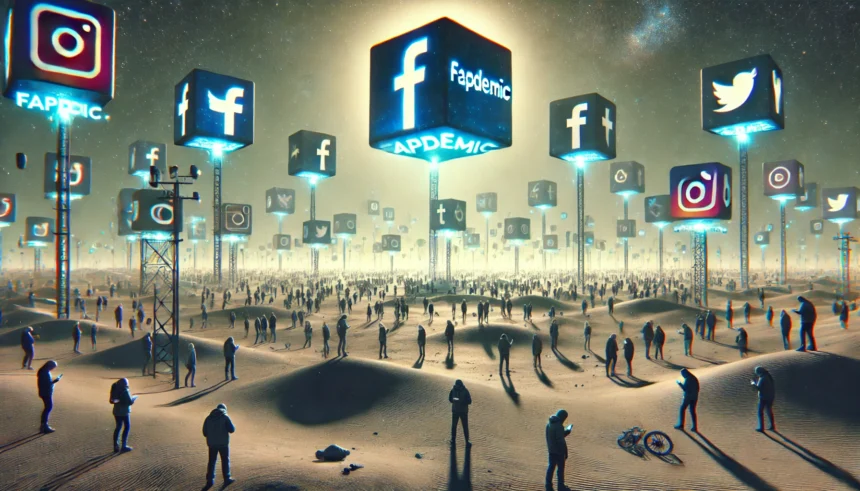The modern world is more connected than ever, with smartphones, social media, and online entertainment dominating our daily lives. However, this excessive digital consumption has given rise to a new problem known as the fapdemic. This term represents the overwhelming overuse of digital platforms, leading to addiction, mental health issues, social isolation, and decreased productivity. While technology has many benefits, its misuse can negatively affect our well-being. Understanding the causes, effects, and possible solutions to the fapdemic is essential to finding a balance in our digital lives.
The Digital Age: How We Got Here
Technology has evolved rapidly over the last few decades. With smartphones, fast internet, and engaging digital content, people now have unlimited access to entertainment, social interaction, and information.
The Rise of Digital Platforms
- Social media apps like Instagram, TikTok, and Facebook keep users engaged with endless scrolling.
- Video streaming services like YouTube and Netflix provide unlimited content on demand.
- Gaming platforms create immersive experiences that can lead to addiction.
- The rise of remote work and online education has increased screen time.
These advancements have changed the way we interact, work, and entertain ourselves. However, this convenience comes at a cost.
The Shift in Social Behavior
Before smartphones, people interacted more in person. Now, most communication happens through texts, video calls, and social media. While this has made communication faster and easier, it has also reduced real-world social interactions. Many people prefer online conversations over face-to-face meetings, leading to a decline in deep personal connections.
Impact of the Fapdemic
The overuse of digital platforms affects various aspects of life, including mental health, productivity, and relationships.
Mental Health Challenges
- Constant exposure to social media can lead to anxiety and depression.
- People compare their lives to others, leading to low self-esteem.
- The pressure to stay updated and connected creates stress and burnout.
Addiction and Dependency
- Digital platforms use algorithms to keep users engaged, making it hard to stop.
- The brain releases dopamine (the “feel-good” hormone) when scrolling, playing games, or watching videos, reinforcing addictive behavior.
- Many people feel uncomfortable or anxious when they are away from their phones.
Decreased Productivity
- Constant notifications and distractions reduce focus.
- People struggle to complete tasks due to shortened attention spans.
- Procrastination increases as digital distractions take priority over important work.
Social Isolation
- Excessive online interaction can make people feel lonely and disconnected.
- The illusion of being connected online replaces meaningful real-world relationships.
- People spend less time engaging in face-to-face conversations and outdoor activities.
Causes of the Fapdemic
Understanding why digital overconsumption happens can help in finding solutions.
Ease of Access and Convenience
- Smartphones and the internet provide 24/7 connectivity.
- With just a few taps, people can access entertainment, news, and social interactions.
- This ease of access makes it hard to disconnect.
Platform Design and Algorithm Manipulation
- Social media, games, and video platforms use algorithms to maximize engagement.
- Features like autoplay, notifications, and endless scrolling encourage prolonged usage.
- The design of these apps prioritizes profit over user well-being.
Cultural Shift Toward Digital Dependency
- In modern society, people rely on digital platforms for work, education, and entertainment.
- There is a growing expectation to always be available and responsive online.
- Many people feel pressured to stay updated, leading to excessive screen time.
Consequences of Overuse
The fapdemic has both physical and psychological consequences.
Physical Health Impacts
- Eye strain and headaches from prolonged screen exposure.
- Poor posture and back pain due to extended phone and laptop use.
- Sleep disturbances caused by blue light from screens disrupting melatonin production.
Emotional and Cognitive Effects
- Reduced ability to focus and think critically due to constant digital distractions.
- Emotional instability caused by exposure to negative or overwhelming online content.
- Decreased creativity as people spend more time consuming rather than creating.
Social Strain
- Weaker relationships as people prioritize online engagement over personal interactions.
- Increased digital conflict due to misunderstandings and online arguments.
- Decline in social skills, making real-world interactions awkward or uncomfortable.
Solutions to Combat the Fapdemic
To regain control over digital consumption, individuals must take conscious steps to reduce screen time and improve their well-being.
Digital Detox
- Take regular breaks from screens to focus on offline activities.
- Set specific no-phone hours, such as during meals or before bedtime.
- Engage in hobbies that do not involve screens, such as reading, sports, or art.
Mindful Consumption
- Be aware of how much time is spent online and reduce unnecessary usage.
- Follow only meaningful and educational content instead of mindless scrolling.
- Use apps that track screen time to monitor and control digital habits.
Prioritizing Real-World Connections
- Spend more time with family and friends in person.
- Engage in face-to-face conversations rather than relying on text or calls.
- Plan social activities that involve physical presence, like traveling or sports.
Setting Boundaries with Technology
- Turn off unnecessary notifications to avoid distractions.
- Create tech-free zones, such as the bedroom or dining area.
- Limit social media usage by scheduling specific times for checking updates.
Conclusion
The fapdemic is a modern issue caused by excessive digital consumption, affecting mental health, productivity, and social interactions. While technology offers many benefits, its misuse can lead to addiction, stress, and isolation. To combat this, people must adopt mindful digital habits, take regular breaks, and prioritize real-world relationships.
Technology will continue to evolve, but finding a healthy balance between the digital world and real life is essential for long-term well-being. By taking small but meaningful steps, individuals can reduce their dependency on screens and lead a more fulfilling life.
FAQs
What is the fapdemic?
The fapdemic refers to excessive digital consumption, including social media, gaming, and screen addiction, leading to mental and social issues.
How does the fapdemic affect mental health?
It increases anxiety, stress, and depression due to constant digital engagement, comparison culture, and dopamine-driven addiction.
Why is it hard to break free from digital addiction?
Digital platforms use algorithms, autoplay, and notifications to keep users engaged, making it difficult to stop excessive screen time.
What are some physical effects of digital overuse?
It can cause eye strain, sleep disturbances, poor posture, and reduced physical activity, affecting overall health.
How can I reduce my screen time effectively?
Set daily screen limits, turn off unnecessary notifications, take tech-free breaks, and engage in offline hobbies.


